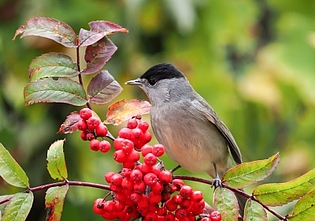Topic in Focus
Measures to Protect Biodiversity

Image: Adobe Stock / Robin
In their joint statement of autumn 2020, the Leopoldina, the German Academy of Science and Engineering acatech, and the Union of the German Academies of Sciences and Humanities call for prompt action. It states: “The decline in agricultural biodiversity is so dramatic that researchers predict serious knock-on effects for the functionality of agricultural ecosystems and for human well-being in the future.” With the right measures, however, the decline of species in the agricultural landscape could not only be halted, but also reversed.
Since the causes and effects of species decline touch many decision and action levels, any measures taken would have to consider political, economic, legal, and social conditions. Therefore, policymakers, local authorities, agriculture, trade, consumers, and the scientific community should be involved.
Changing environmental policy
Farmers receive transfer payments through the European Union's Common Agricultural Policy (CAP). These payments are mainly based on the surface area regardless of the production type, i.e., not linked to whether the farm is working for the common good. The EU also promotes voluntary environmental measures. In the statement, the scientists criticize that the agricultural regulations do not protect biodiversity effectively enough. They demand that biodiversity-friendly farming must be worthwhile for farmers. The protection of biological diversity should be given more financial support.
“Funds in Brussels are currently distributed mainly according to how much land a farmer cultivates, simply based on hectares. So large farms get a lot and small farms get little. In the future, this should be linked much more to their contribution to the common good. In other words, what they are actively doing for environmental protection, biodiversity conservation, and climate protection. Very good models are already available to convert this and award certain points for specific contributions. This would put the focus much more on the common good, what concerns all of us, and what is good for all of us.”
“We can't afford any more loss.”
Changing consumption and lifestyle
When it comes to protecting biodiversity, it is not only the policymakers who are called upon but also the consumers. The central element of a sustainable lifestyle is nutrition: our meat consumption, in particular, is contributing to the decline in biodiversity, as feed cultivation and livestock farming take up large areas of land and are extremely industrialized. A change in diet also compensates for the lower productivity of farmland. Trade can contribute to greater biodiversity by labeling products from regional biodiversity-friendly production accordingly. According to the statement, food losses should be reduced on both sides, in trade and among consumers.
The awareness of the value of biological diversity must be strengthened in society, for the extinction of species is irreversible and individual species cannot be replaced. As visible pioneers and opinion leaders, municipalities should be committed to biodiversity, the scientists point out in the statement. In order to check the effectiveness of measures, the experts call for nationwide and standardized monitoring. The protection of biodiversity is a joint task.
“The bigger picture has a lot to do with consumption.”
“We all need to work on ourselves.”
Published: October 2020
Previous page: Causes and effects of species decline
